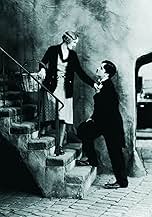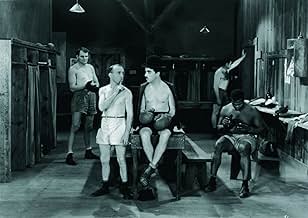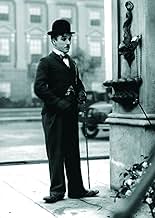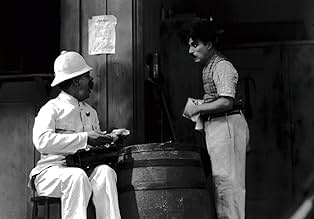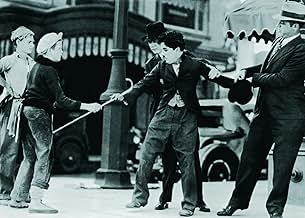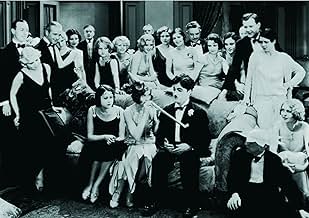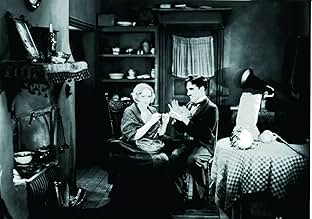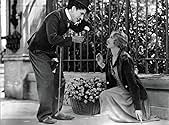With the aid of a wealthy erratic tippler, a dewy-eyed tramp who has fallen in love with a sightless flower girl accumulates money to be able to help her medically.With the aid of a wealthy erratic tippler, a dewy-eyed tramp who has fallen in love with a sightless flower girl accumulates money to be able to help her medically.With the aid of a wealthy erratic tippler, a dewy-eyed tramp who has fallen in love with a sightless flower girl accumulates money to be able to help her medically.
- Director
- Writers
- Stars
- Awards
- 6 wins total
Charles Chaplin
- A Tramp
- (as Charlie Chaplin)
Al Ernest Garcia
- The Millionaire's Butler
- (as Allan Garcia)
Johnny Aber
- Newsboy
- (uncredited)
Jack Alexander
- Boxing Match Spectator
- (uncredited)
T.S. Alexander
- Doctor
- (uncredited)
Victor Alexander
- Superstitious Boxer
- (uncredited)
Albert Austin
- Street Sweeper
- (uncredited)
- …
Harry Ayers
- Cop
- (uncredited)
Eddie Baker
- Boxing Fight Referee
- (uncredited)
Henry Bergman
- Mayor
- (uncredited)
- …
Edward Biby
- Nightclub Patron
- (uncredited)
Buster Brodie
- Bald Party Guest
- (uncredited)
Jeanne Carpenter
- Diner in Restaurant
- (uncredited)
- Director
- Writers
- All cast & crew
- Production, box office & more at IMDbPro
Summary
Reviewers say 'City Lights' is celebrated for its blend of comedy and pathos, showcasing Charlie Chaplin's iconic Tramp character in a poignant love story with a blind flower girl. The film is praised for its masterful physical comedy, expressive acting, and memorable scenes, particularly the boxing match and the emotional finale. Chaplin's direction, composition of the score, and the film's historical significance are frequently highlighted. However, some reviewers note that the silent format and slow pacing may challenge modern audiences. The themes of love, selflessness, and social commentary resonate deeply, making 'City Lights' a timeless classic.
Featured reviews
City Lights (1931)
**** (out of 4)
Charlie Chaplin returns as The Tramp and this time he falls in love with a blind girl (Virginia Cherrill) and sets out to help her. The Tramp eventually meets a suicidal drunk (Harry Myers) and their friendship leads to what might eventually help the girl he loves.
Chaplin made great films before and after CITY LIGHTS but for my money this here is his greatest film as well as one of the greatest films ever made. Not only is it one of the funniest movies ever made but I'd also argue that it's one of the greatest love stories, if not the greatest. It really says a lot when a movie can conqueror two genres at one time but CITY LIGHTS is simply one of the greatest movies ever made.
I think it says a lot that you get one classic scene after another and there's really not a weak spot to be found here. Being 1931 it took some real guts for Chaplin to deliver a silent film and I think he knew that he had to deliver something special because people had moved onto sound. He certainly delivered something special as this here was easily the funniest film he had made up to this point. The opening sequence with the introduction of The Tramp was priceless and we got one hilarious scene after another from that point.
The scenes with the drunk are downright hilarious as is another scene where The Tramp is trying to eat but without much success. The cigar sequence is a masterpiece as is the by the water. In fact, the story between The Tramp and the drunk would have made a terrific movie on its own. Just like the stuff with The Tramp and the blind girl would have made a perfect film. What's so special is that you get both stories wrapped up in one and it really delivers.
Chaplin played The Tramp countless times but he was never better than he is here. Just check out the timing in countless scenes including the boxing match and you can't help but be impressed with the actor. Myers also deserves a lot of credit as the drunk as his timing has to match that of Chaplin throughout and the two men do a wonderful job together. Then you've got Cherrill who wasn't a professional actor but the director makes her shine throughout.
CITY LIGHTS contains one great scene after another and all of the laughs lead up to one of the most powerful endings in film history. There's really not enough great things that can be said about this film as it continues to get better with each passing year.
**** (out of 4)
Charlie Chaplin returns as The Tramp and this time he falls in love with a blind girl (Virginia Cherrill) and sets out to help her. The Tramp eventually meets a suicidal drunk (Harry Myers) and their friendship leads to what might eventually help the girl he loves.
Chaplin made great films before and after CITY LIGHTS but for my money this here is his greatest film as well as one of the greatest films ever made. Not only is it one of the funniest movies ever made but I'd also argue that it's one of the greatest love stories, if not the greatest. It really says a lot when a movie can conqueror two genres at one time but CITY LIGHTS is simply one of the greatest movies ever made.
I think it says a lot that you get one classic scene after another and there's really not a weak spot to be found here. Being 1931 it took some real guts for Chaplin to deliver a silent film and I think he knew that he had to deliver something special because people had moved onto sound. He certainly delivered something special as this here was easily the funniest film he had made up to this point. The opening sequence with the introduction of The Tramp was priceless and we got one hilarious scene after another from that point.
The scenes with the drunk are downright hilarious as is another scene where The Tramp is trying to eat but without much success. The cigar sequence is a masterpiece as is the by the water. In fact, the story between The Tramp and the drunk would have made a terrific movie on its own. Just like the stuff with The Tramp and the blind girl would have made a perfect film. What's so special is that you get both stories wrapped up in one and it really delivers.
Chaplin played The Tramp countless times but he was never better than he is here. Just check out the timing in countless scenes including the boxing match and you can't help but be impressed with the actor. Myers also deserves a lot of credit as the drunk as his timing has to match that of Chaplin throughout and the two men do a wonderful job together. Then you've got Cherrill who wasn't a professional actor but the director makes her shine throughout.
CITY LIGHTS contains one great scene after another and all of the laughs lead up to one of the most powerful endings in film history. There's really not enough great things that can be said about this film as it continues to get better with each passing year.
If there is one Charlie Chaplin film to recommend, as others have pointed to in the past, City Lights is the one. Though Chaplin played his Tramp character superbly in other movies, like Modern Times and The Gold Rush, City Lights displays the Tramp at his funniest, his bravest, his most romantic, and his most sympathetic. It's tough for filmmakers in recent days to bring the audience so close emotionally with the characters, but it's pulled off.
The film centers on three characters- the Tramp, the quintessential, funny homeless man who blends into the crowd, but gets caught in predicaments. He helps a drunken businessman (Myers, a fine performance in his own right) from suicide, and becomes his on and off again friend (that is, when it suits him and doesn't notice his 'friend's' state). The other person in the Tramp's life is the Blind Flower Girl (Virginia Cherrill, one of the most absorbing, beautiful, and key female performances in silent film), who are quite fond of each other despite the lack of total perception. The emotional centerpiece comes in obtaining rent and eye surgery money, which leads to a (how else can I put it) magical boxing match where it's basically a 180 from the brutality and viscerality of a match in say Raging Bull.
Though there is no dialog, the film achieves a timelessness- it's essentially a tale of two loners who find each other, lose each other, and find each other again (the last scene, widely discussed by critics for decades, is moving if not tear-inducing). And it's never, ever boring- once you get along with the Tramp, you find the little things about him, the reaction shots, the little things he does after the usual big gag (look to the ballroom scene for examples of this, or when he gets a bottle of wine poured down his pants without the other guy noticing). Truth be told, if this film makes you indifferent, never watch Chaplin again. But if you give yourself to the film, you may find it's one of the most charming from the era, or perhaps any era.
The film centers on three characters- the Tramp, the quintessential, funny homeless man who blends into the crowd, but gets caught in predicaments. He helps a drunken businessman (Myers, a fine performance in his own right) from suicide, and becomes his on and off again friend (that is, when it suits him and doesn't notice his 'friend's' state). The other person in the Tramp's life is the Blind Flower Girl (Virginia Cherrill, one of the most absorbing, beautiful, and key female performances in silent film), who are quite fond of each other despite the lack of total perception. The emotional centerpiece comes in obtaining rent and eye surgery money, which leads to a (how else can I put it) magical boxing match where it's basically a 180 from the brutality and viscerality of a match in say Raging Bull.
Though there is no dialog, the film achieves a timelessness- it's essentially a tale of two loners who find each other, lose each other, and find each other again (the last scene, widely discussed by critics for decades, is moving if not tear-inducing). And it's never, ever boring- once you get along with the Tramp, you find the little things about him, the reaction shots, the little things he does after the usual big gag (look to the ballroom scene for examples of this, or when he gets a bottle of wine poured down his pants without the other guy noticing). Truth be told, if this film makes you indifferent, never watch Chaplin again. But if you give yourself to the film, you may find it's one of the most charming from the era, or perhaps any era.
This is my favorite Chaplin film, but I don't want that to diminish his other work, either. MODERN TIMES was an outstanding work of social satire, THE GOLD RUSH was great slapstick, and even the largely-neglected MONSIEUR VERDOUX strikes a certain unforgettable tone. Chaplin didn't make a bad movie, and I'm not even sure that CL is his best, exactly. But it IS my favorite, if only for the ending.
That ending has been the subject of much comment here. I think it's a masterpiece in a single scene. Chaplin's little tramp has never seemed less like a character and more like a living, breathing human being. It's a monument to understated sentimentality.
To me, the rest of the film exists largely to set the context for that one magnificent piece of celluloid. Yes, the boxing scene is great, and the scene where he rescues the millionaire is also wonderful, but it's that ending that makes us all love this movie.
That ending has been the subject of much comment here. I think it's a masterpiece in a single scene. Chaplin's little tramp has never seemed less like a character and more like a living, breathing human being. It's a monument to understated sentimentality.
To me, the rest of the film exists largely to set the context for that one magnificent piece of celluloid. Yes, the boxing scene is great, and the scene where he rescues the millionaire is also wonderful, but it's that ending that makes us all love this movie.
Chaplin takes himself a little more seriously in City Lights, and the results are spectacular. The musical score which Chaplin composed for the film was one of the many highlights, and even though Charlie's performance is much more dramatic than usual in some scenes, the hilarious comedy for which he is known and loved is still abundant.
City Lights is so well made that it is one of the very few movies in which the obvious flaws can be gladly overlooked. Yes, you can clearly see the string holding Chaplin up in the sidesplittingly funny boxing scene, but who cares? That is such classic slapstick that little things like that really don't matter. Besides, let's keep in mind that this movie was made seventy years ago.
Chaplin does a phenomenal job in his traditional role of the tramp, and develops a perfectly convincing romantic relationship with the blind flower girl on the sidewalk. His friendship with the drunken rich guy is hilarious, but it also makes a significant comment about the problems of alcohol. This is truly a great film, which should not be forgotten.
City Lights is so well made that it is one of the very few movies in which the obvious flaws can be gladly overlooked. Yes, you can clearly see the string holding Chaplin up in the sidesplittingly funny boxing scene, but who cares? That is such classic slapstick that little things like that really don't matter. Besides, let's keep in mind that this movie was made seventy years ago.
Chaplin does a phenomenal job in his traditional role of the tramp, and develops a perfectly convincing romantic relationship with the blind flower girl on the sidewalk. His friendship with the drunken rich guy is hilarious, but it also makes a significant comment about the problems of alcohol. This is truly a great film, which should not be forgotten.
As always the little tramp is fleeing the long arm of the law when he is mistaken for a wealthy man by a blind girl selling flowers by the roadside. While he longs to help her the tramp knows he cannot. However when he is at his lowest he stumbles upon a drunken man who he helps out who may be able to help him in turn if the two of them can sober up long enough.
In response to seeing some modern trash posing as "comedies" recently (Little Man, Norbit, Pluto Nash I'm looking at you) I decided to check out some comedies that have stood the test of time a few Chaplin films being among them. City Lights is one of those film that you will think you have seen even when you have not. I knew I had never actually seen it but the wonderful opening scene on the statue and the scenario of the blind girl by the side of the road were very familiar to me and I was right into it from the start. As was often the case, this film has a thin narrative but one that allows for several scenarios for Chaplin to work his magic. And so he does with some classic sequences across the whole film.
The statue scene is memorable for how he makes so much out of so little but the brilliant choreography of the boxing match had me rolling with laughter as it moved so beautifully and imaginatively around the ring. Chaplin is a master and this is just one of many films that shows it as he creates a great little clown that we care about but can also laugh at. His support do no more than that support him but yet they are also roundly good. Cherrill provides attractive heart despite her simple character, while Myers, Garcia, Mann and a few others do good physical work alongside Chaplin.
City Lights is a really great film that is all the more impressive for still feeling fresh and funny more than seventy years after it was made. The simple narrative is the frame but it is the wonderful and frequent set-pieces that tickle and also stick in the mind. So tonight you might be looking at your film queue with lots of modern comedies but it is worth bumping this classic to the top of the list instead.
In response to seeing some modern trash posing as "comedies" recently (Little Man, Norbit, Pluto Nash I'm looking at you) I decided to check out some comedies that have stood the test of time a few Chaplin films being among them. City Lights is one of those film that you will think you have seen even when you have not. I knew I had never actually seen it but the wonderful opening scene on the statue and the scenario of the blind girl by the side of the road were very familiar to me and I was right into it from the start. As was often the case, this film has a thin narrative but one that allows for several scenarios for Chaplin to work his magic. And so he does with some classic sequences across the whole film.
The statue scene is memorable for how he makes so much out of so little but the brilliant choreography of the boxing match had me rolling with laughter as it moved so beautifully and imaginatively around the ring. Chaplin is a master and this is just one of many films that shows it as he creates a great little clown that we care about but can also laugh at. His support do no more than that support him but yet they are also roundly good. Cherrill provides attractive heart despite her simple character, while Myers, Garcia, Mann and a few others do good physical work alongside Chaplin.
City Lights is a really great film that is all the more impressive for still feeling fresh and funny more than seventy years after it was made. The simple narrative is the frame but it is the wonderful and frequent set-pieces that tickle and also stick in the mind. So tonight you might be looking at your film queue with lots of modern comedies but it is worth bumping this classic to the top of the list instead.
Did you know
- TriviaChaplin re-shot the scene in which the Little Tramp buys a flower from the blind flower-girl 342 times, as he could not find a satisfactory way of showing that she thought the mute tramp was wealthy.
- Goofs(at around 50 mins) When the man swallows part of the Tramp's soap and starts spraying bubbles, the tube used to spray the bubbles is clearly visible behind him.
- Quotes
The Tramp: You can see now?
A Blind Girl: Yes, I can see now.
- Alternate versionsAbout seven minutes of footage of Georgia Hale playing the flower girl exists and is included in the 2003 DVD release. The footage was shot during a brief period when the actress originally cast to play the character had been fired and replaced with Hale, but Charles Chaplin was forced to resume filming with the original actress due to the amount of film already shot.
- ConnectionsEdited into Histoire(s) du cinéma: Fatale beauté (1994)
Details
- Release date
- Country of origin
- Official site
- Languages
- Also known as
- Luces de la ciudad
- Filming locations
- Production company
- See more company credits at IMDbPro
Box office
- Budget
- $1,500,000 (estimated)
- Gross US & Canada
- $19,181
- Opening weekend US & Canada
- $9,102
- Jul 8, 2007
- Gross worldwide
- $55,154
- Runtime1 hour 27 minutes
- Color
- Sound mix
Contribute to this page
Suggest an edit or add missing content


